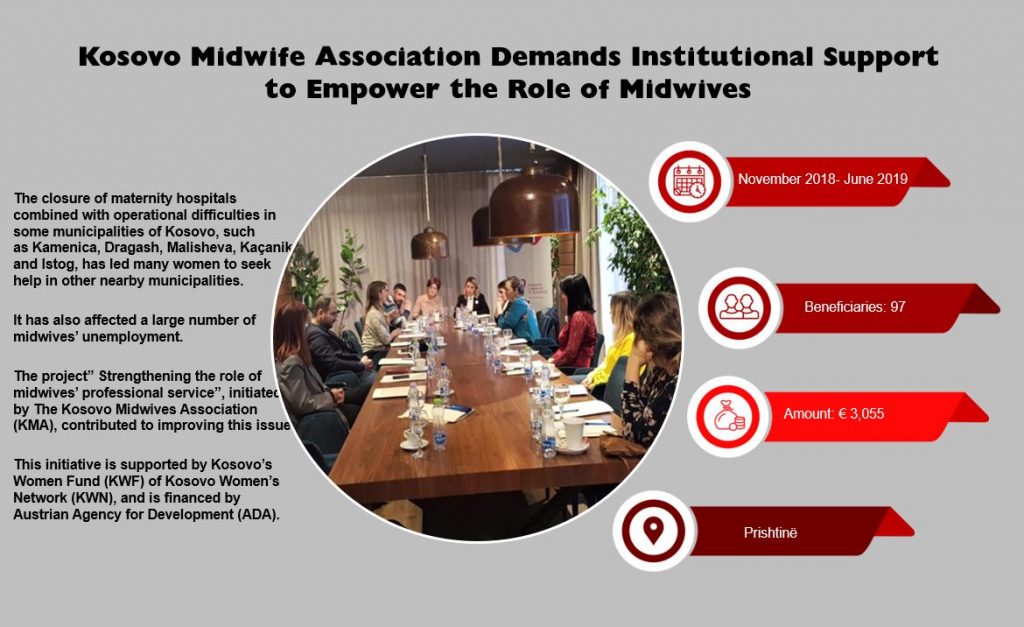The closure of maternity hospitals combined with operational difficulties in some municipalities of Kosovo, such as Kamenica, Dragash, Malisheva, Kaçanik and Istog, has led many women to seek help in other nearby municipalities. It has also affected a large number of midwives’ unemployment.
For many pregnant women, the closure of maternity hospitals has been a huge obstacle, including additional costs.
The project” Strengthening the role of midwives’ professional service”, initiated by The Kosovo Midwives Association (KMA), contributed to improving this issue.
With the support of the Kosovo Women’s Fund (KGF), KMA through many activities such as roundtables, meetings with institutional leaders, drafting recommendations, and mapping a request for the draft law on midwifery professional services. Their media promotion has managed to raise awareness of the importance of the midwifery to the well-being of mothers and children.
A total of 97 people benefited from this initiative, 84 women and 13 men. The project was praised by midwives, civil society representatives and institutions.
“Responsible institutions for many years have oppressed us, they neither have appreciated nor have invested in our profession, but the great love for the profession has made us ignore them,” said one of the midwives during a discussion.
On 12 December, the Kosovo Midwives Association (KMA) organized the round table discussion. It was attended by the directors of Health and Social Welfare Departments from different municipalities of Kosovo, members of the Municipal Assembly of Prishtina, representatives of the Institute of Public Health and civil society organizations.
The round table was intended to address the draft law on the midwifery professional service and midwives’ role for the health of the population.
During the roundtable, Magbule Elezi, the President of the Kosovo Association of Midwives, called for support from the institutions present.; With their institutional and state responsibility and influence they will continue their joint commitment to this cause.
“Through health policies, institutional support and professional development we can improve the quality of services and increase the well-being of our women and citizens, as well as improve their lives”, said Ms. Elezi.
Besa Baftiu, the Head of the Parliamentary Committee on Health and Social Welfare, said that “As a committee, we have raised concerns about the closure of maternity hospitals and we are continuing cooperation with KMA to find a solution for midwives to take their place”.
Some of the recommendations from the roundtable, are as it follows:
- Involvement of midwives in the process of drafting guidelines and clinical protocols in obstetrics,
- Description of work tasks, depending on the institution where midwives work,
- Regular vocational trainings for midwives,
- Representation of midwives in decision-making within institutions,
- Raising and strengthening teamwork,
- KMA to be included in debate and decision-making groups regarding all legal and sub-legal acts for the profession of midwife,
- Delegation of gynecologists from the Ministry of Health to all maternity hospitals, which enables faster re-functionalization of maternity hospitals,
- Description of work tasks and competencies.
Another successful meeting was held with the president for accreditation of the Faculty of Medicine – Midwives Department, where the re-accreditation of this department was promised. They managed to sign a memorandum of cooperation between the Faculty of Medicine and KMA.
KMA has also held meetings with the Association of Nurses and Midwives of Albania, where a memorandum of cooperation was signed in order for both countries to organize continuous meetings and share experiences.
The recommendations are as follows:
- The Ministry of Health to ensure the participation of KMA representatives in working groups for the drafting of policies and strategies in terms of mothers and children health and reproductive health,
- The Ministry of Health to consult counterparts from the Republic of Croatia in order to advance the role of midwives following the Croatian law and model,
- The Ministry of Health to provide programs, guidelines, standards for information and capacity building for reproductive health that effect the health of mothers and children, family planning, fertility, early births, and preventable diseases,
- The Ministry of Health to take measures on preventing the closing of maternity hospitals in municipalities, as the lack of this service in some units has seriously endangered the health of women and children,
- The Ministry of Health to develop a plan of human resources for midwives and other health professionals in order to increase the number of midwives; to provide opportunities for continuous professional development for managers of health institutions and midwives, and thus strengthening basic skills and knowledge in order to providing quality and equal services for maternal and child health in all maternity units,
- The Ministry of Health to consider Directive no. 2005/36 / EC of the European Union (EU) on professional qualifications for midwives.
The positive results achieved during these months contribute to the previews efforts of KWN and KMA to improve the conditions of maternity hospitals in Kosovo.
This project is supported by the Kosovo Women’s Fund (KWF) of Kosovo Women’s Network (KWN), and funded by the Austrian Development Agency (ADA).





